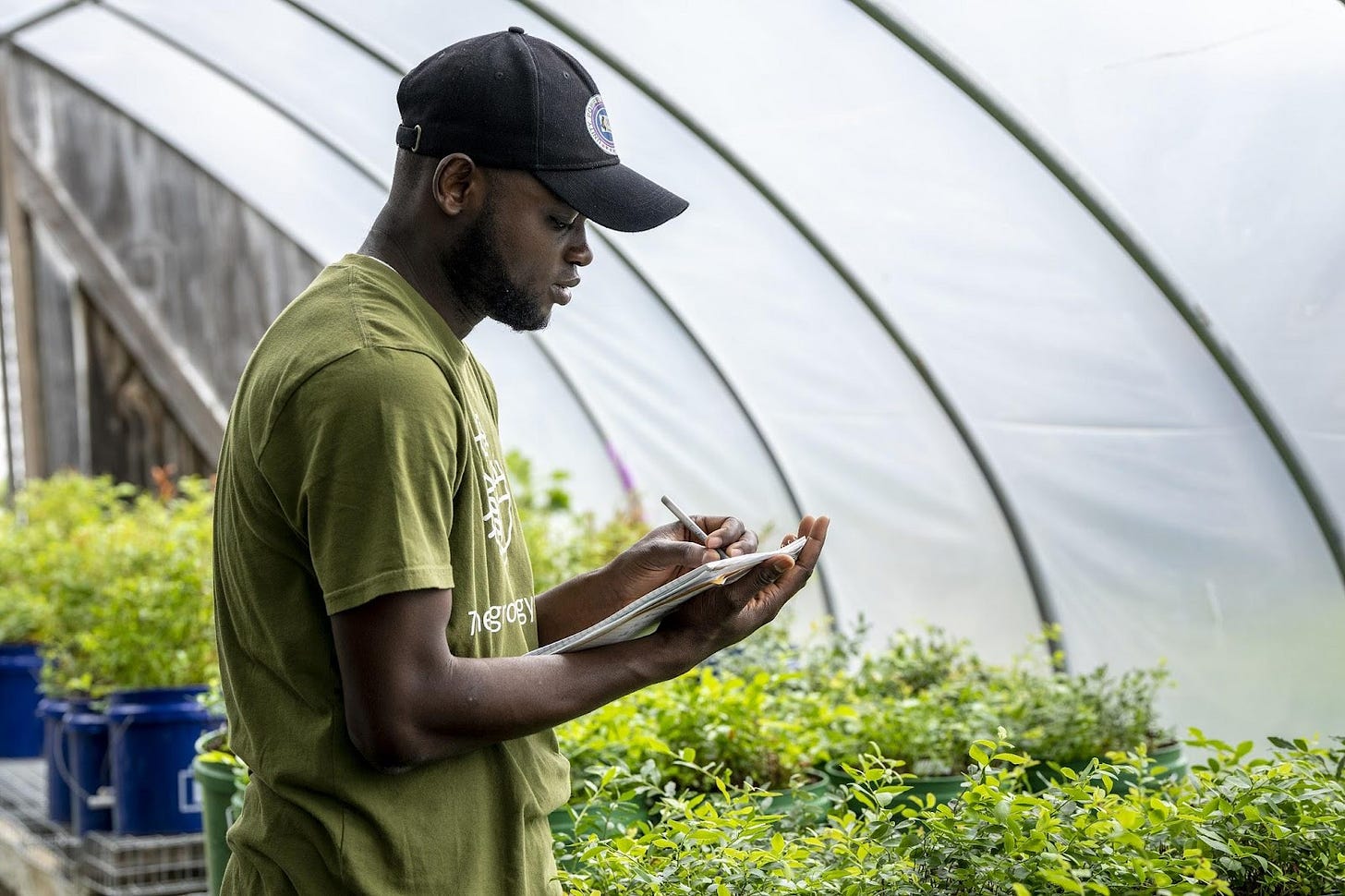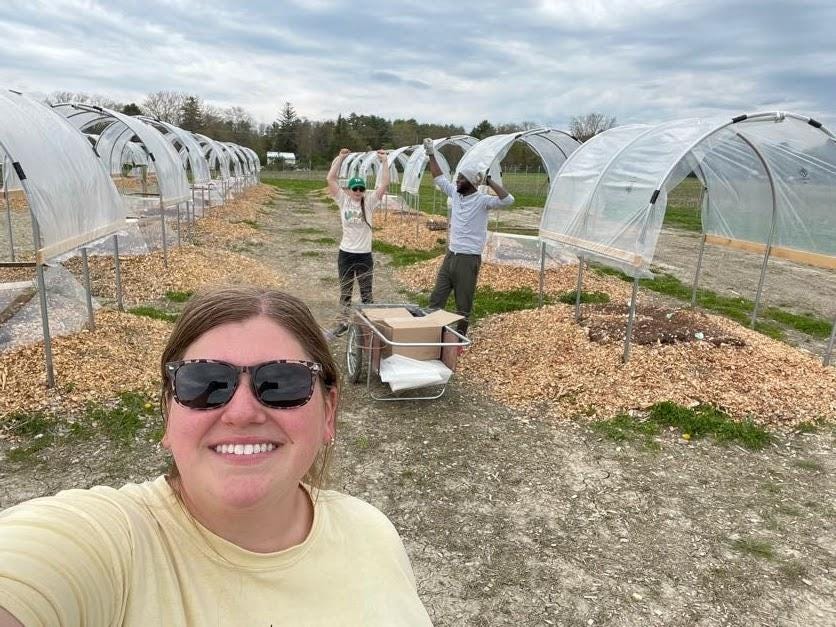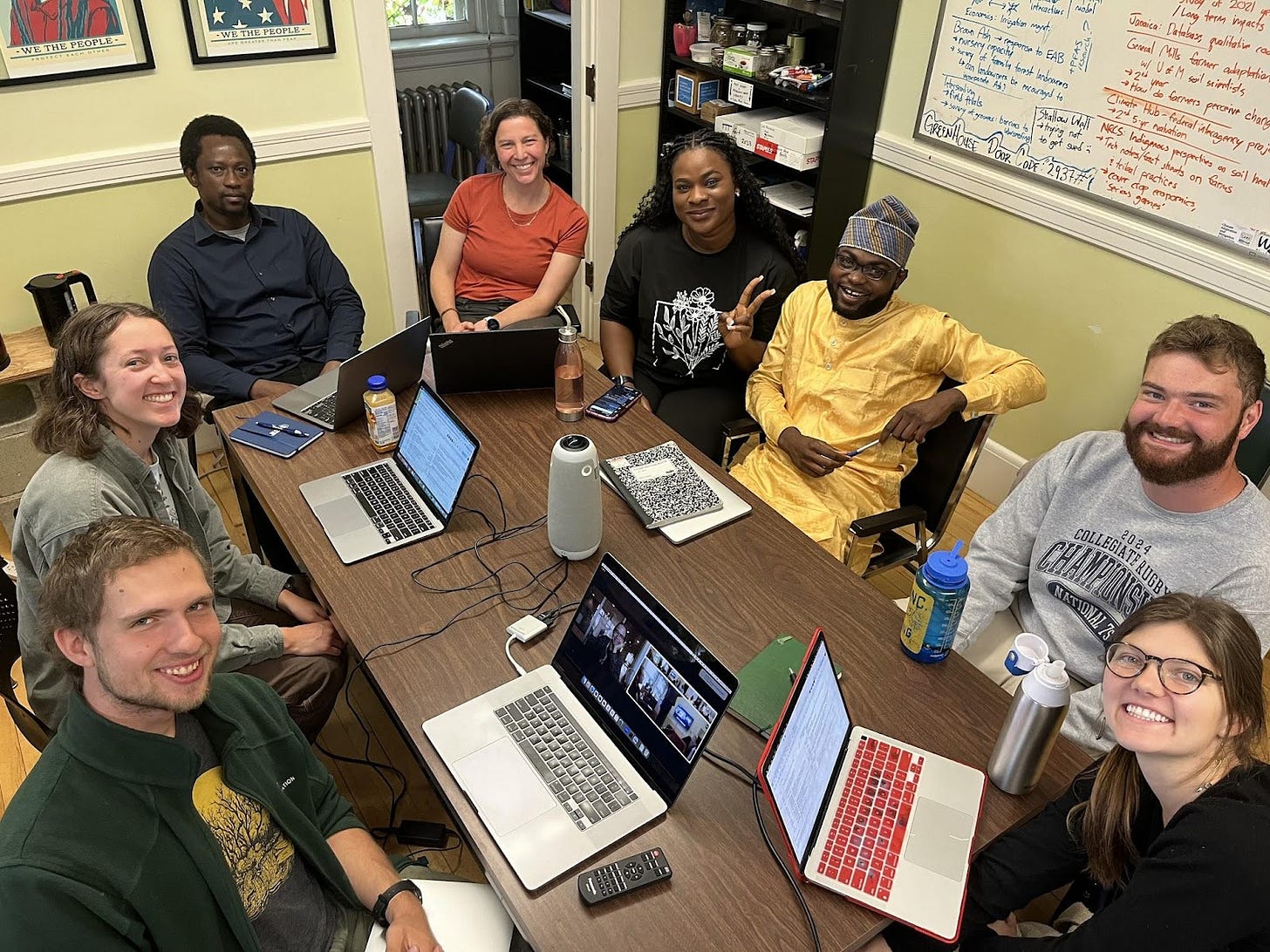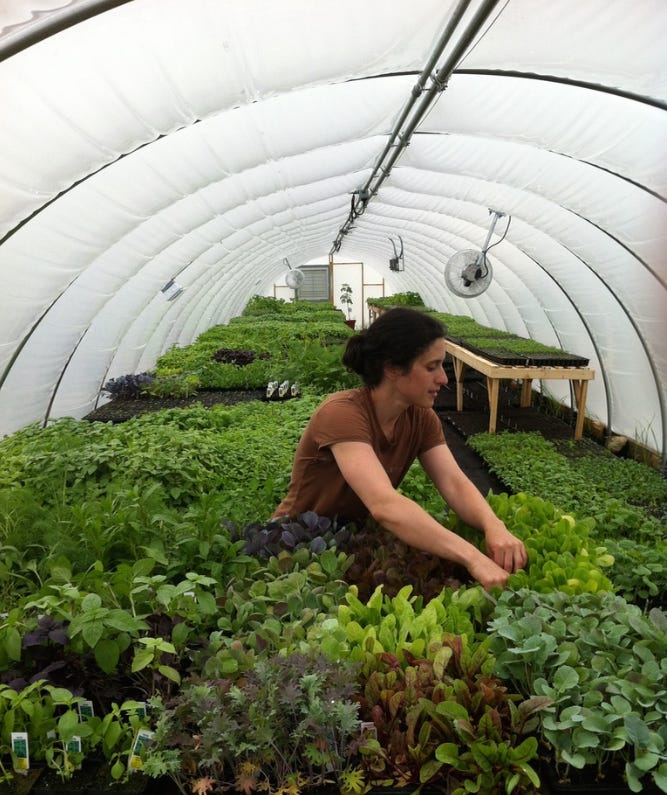Schattman: Why or how do you want to include principles of agroecology in your work?
Dr Rachel Schattman is an Assistant Professor of Sustainable Agriculture at the University of Maine.
As an agroecologist, I am energized by the potential of this discipline to solve difficult problems.
However, I was drawn to the practice of sustainable agriculture long before I knew what agroecology was. I worked on vegetable farms in the summers when I was in highschool; volunteered on a biodynamic community supported agriculture (CSA) farm outside of Traverse Bay, Michigan; milked cows and goats, and made cheese and hay in the years before and during grad school; and eventually started my own diversified vegetable and value-added product operation (Bella Farm LLC), which I ran for just over a decade. This experience of running a farm business has proven to be the foundation for all of the professional roles I have held since. Through these different hands-on experiences in agriculture, I had a lot of time in the field and the milking parlour to mull over the questions “is this sustainable agriculture? How can you tell?”
Other than farming, I had the good fortune to work towards the realization of sustainable agriculture and food systems in several other capacities. I was mentored in both Extension and adult education during my time at the University of Vermont Extension Center for Sustainable Agriculture, working under Dr. Linda Berlin; and in research while studying with Dr. Ernesto Méndez (now co-director of the UVM Institute for Agroecology). It was in these outreach and research positions that I developed a deep respect for the tools that public institutions bring to bear on the complex problems facing our world today. Such problems are the antitheses of sustainability, if you consider sustainability to be our continued ability—and the ability of our planet—to exist into the future.
One of the things that most draws me to the discipline is that agroecology has space for complexity. It allows us to investigate the mechanisms by which systems can be made more (or less) sustainable using all of the tools aligned with practice, science, and movement, components put forth by Wezel et al., (2009)’s definition of agroecology. I’ll use two examples from my lab’s current work to illustrate how my team goes about this task.
It takes a (transdisciplinary) village: Wild blueberries and climate change
As a field-based agroecologist, I design studies that weave together the skills and perspectives of many types of people. I am currently leading a project focused on how probable future climate scenarios will alter wild blueberry (Vaccinium angustifolium) agroecosystems, including the plants’ growth and interactions with fungi and pollinators (thanks to the support of USDA-NIFA, BNRE Sustainable Agroecosystems program). Our team includes industry-based agroecologists, plant physiologists, entomologists, mycologists, climatologists, economists, and crop modelers. Together, we have developed a four year field experiment, and we are also researching the economic implications of installing water management systems on blueberry farms, and estimating how well wild blueberries will fare in future conditions using crop models. Our hope is that by approaching the topic from many different angles and integrating many different ways of knowing, we can develop insights that will help this culturally, ecologically, and economically important agroecosystem.

Is this agroecology? Yes, because we bring together people from many different points of view and types of training to engage in solving a problem in a transdisciplinary manner. Méndez et al. submit the following definition of transdisciplinarity, as it relates to agroecology:
We consider transdisciplinary approaches as those that value and integrate different types of knowledge systems, which can include scientific or academic disciplines, as well as different types of knowledge systems (i.e., experiential, local, indigenous, etc.), as well as adopt a problem-based focus (Méndez et al., 2013, p. 8).
The authors emphasize the importance of integrating diverse ways of understanding agricultural systems and livelihoods in the research and action process, including the perspectives held by those who manage land. I propose that this integration is critical to manifesting transdisciplinary research, but is not enough. Rather, the insights generated through integrating diverse bodies of knowledge must transform into something that no singular discipline (or way of seeing) could accomplish on its own. It’s important to pursue this goal because the complex problems we are trying to solve are not adequately addressed by agronomy, economics, entomology, or any other discipline alone.
While we will not know until the end of the wild blueberry project whether we have achieved this lofty goal, I believe that our team’s willingness to embrace complexity and work together gives us a good shot. Framing our work using agroecology gives us permission to use complexity in service of better science, and access to a community of other researchers and practitioners from which to draw inspiration and support.

It takes an (adaptive) village: Climate planning at the farm scale
Transdisciplinarity can be applied in social science-based agroecology. To illustrate this, let me tell you a little bit about the Climate Adaptation and Mitigation Fellowship, or “CAMF” (also funded by USDA NIFA,). Through this project, I work with a team of professional educators, scientists, federal agencies, and nonprofits to help farmers and agricultural advisors to learn about climate change and create tailored adaptation and mitigation plans.
The program spans the Midwest and the Northeast of the United States, and currently has just over 100 “fellows” enrolled. These fellows are from varied backgrounds and areas of expertise. Some have been formally trained in institutes of higher learning; others through their experiences as service providers, business owners and managers, employers, and as managers of soil, crops, forests, water, and livestock. Many members of our group wear multiple hats: they are Extension specialists and farmers; they are government scientists and PhD students; they grow crops and facilitate workshops.
My collaborators and I have designed the CAMF program to be: (1) Oriented around a real problem that farmers and other land managers face today (i.e., climate change); (2) with educational topics driven by the needs and interests of program participants (e.g., business planning in the context of climate change, agroforestry practices in a changing climate, soil health practices and climate considerations); (3) that leverages the real-world experience of the participants through peer-to-peer interaction and support, community building, and social reinforcement. Our approach to climate change outreach and education in the CAMF program is grounded in principles of Adult Learning Theory and andragogy (Mezirow, 1981), and also the democracy and liberation theology of John Dewey (Dewey, 1897) and Pablo Friere (Freire, 1970). These theories are well aligned with the “action” focus of agroecology, specifically the emphasis on leveraging the power of research and outreach to improve the lives of individuals and the conditions of communities.
Is this agroecology? Yes! Though agroecology as a discipline has not historically engaged deeply with the social sciences, this is rapidly changing (Galt et al., 2024). Using the social sciences, including those that focus on decision making, social psychology, education, and communication, we can make effective and meaningful progress towards solving complex sustainability problems. As a theoretical framework, agroecology has space for people and communities to work together. Its particular focus on power and agency is foundational to our understanding of, and ability to shift, people’s access to tools and knowledge needed to do hard things like manage agroecosystems and adapt to climate change.
The future of agroecology is bright
My work is guided by the belief that we can be more effective at solving the big, complicated problems of our time if we work together, integrate different types of knowledge, and stay focused on common goals. Agroecology is a “big tent” discipline - there is room for many different kinds of people, including scientists, educators, and land stewards, to come together and work on things that are impossible for us to address alone. The elevation of transdisciplinarity as a core principle of contemporary agroecology drives this home.
I am an agroecologist because I want to do this work, and I want to do it with and for my communities. I feel fortunate to be working in a discipline that emphasizes the importance of applied research and action, as we collectively try to improve the world around us. As the poet Marge Piercy wrote the poem “To be of use” in 1982:
“I love people who harness themselves, an ox to a heavy cart,
who pull like water buffalo, with massive patience,
who strain in the mud and the muck to move things forward,
who do what has to be done, again and again.”

References:
Dewey, J., 1897. My pedagogic creed. Kellogg and Company, New York.
FAO, 2018. The 10 Elements of Agroecology: Guiding the Transition to Sustainable Food and Agricultural Systems. Food and Agriculture Organization of United Nations, Rome, Italy.
Freire, P., 1970. Pedagogy of the oppressed. Bloomsbury Academic, New York.
Galt, R.E., Pinzón, N., Robinson, N.I., Baukloh Coronil, M.B., 2024. Agroecology and the social sciences: A half-century systematic review. Agricultural Systems 216, 103881. https://doi.org/10.1016/j.agsy.2024.103881
Holling, C.S., 1973. Resilience and stability of ecological systems. Annual Review of Ecology and Systematics 4, 1–23. https://doi.org/10.1146/annurev.es.04.110173.000245
Méndez, V., Bacon, C., Cohen, R., 2013. Agroecology as a Transdisciplinary, Participatory, and Action-Oriented Approach. Agroecology and Sustainable Food Systems 37, 37–41. https://doi.org/10.1080/10440046.2012.736926
Mezirow, J., 1981. A Critical Theory of Adult Learning and Education. Adult Education Quarterly 32, 3–24. https://doi.org/10.1177/074171368103200101
Wezel, A., Bellon, S., Doré, T., Francis, C., Vallod, D., David, C., 2009. Agroecology as a science, a movement and a practice. A review. Agronomy for Sustainable Development 29, 503–515. https://doi.org/10.1051/agro/2009004






